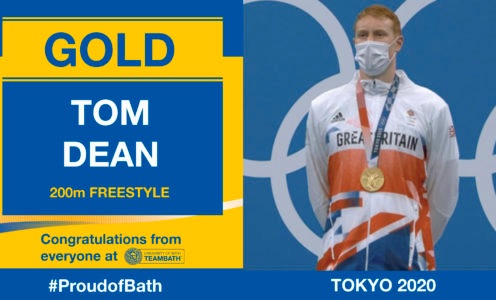Engineers Go for Olympic Gold
Majoring in engineering is a notorious grind, with heavy math and science course loads, labs, and design projects that leave little time for other pursuits.
That hasn’t stopped engineer-athletes from pursuing their Olympic dreams – or bringing home medals. Here’s a sampling of the engineering undergraduates and alumni who made the roster for the Tokyo Games, along with a few faculty members whose expertise has helped boost equipment performance, improve safety, and give athletes in sports as diverse as cycling and volleyball a competitive edge.
University of Bath mechanical engineering student Tom Dean beat COVID-19 – twice – and went on to clinch two gold medals for Team Great Britain at the Tokyo 2020 Olympic Games, clocking a new British record of 1:44.22 in the 200-meter freestyle final and beating ace teammate Duncan Scott by four-hundredths of a second. “It’s amazing; I couldn’t have asked for more,” Dean told the university news service.
North Carolina State University engineering major Anton Ipsen of Denmark swam for his country for the second time at the Olympics, according to the school’s press office, while Louisiana State civil engineering major Juan Celaya-Hernandez, a standout synchronized diver on the school’s swimming and diving team, competed for his native Mexico, coming in a mere tick behind third-place finisher Germany. (China and the United States won gold and silver, respectively.) Louisiana State’s JuVaughn Harrison, a senior majoring in biomedical engineering, was the first man in more than 100 years to compete in both the high and long jump at the Olympics, according to CBS Sports. The last male athlete to do so was the legendary Jim Thorpe in 1912.
The University of Missiouri saw two engineering alumni compete in swimming at the Tokyo Olympics: 2019 graduate Mikel Schreuders, who represented Aruba, and 2017 graduate Fabian Schwingenschlogl, who swam for Germany. The University of Arizona also fielded two industrial and systems engineering graduates on the Olympic roster: Rafael Quintero, a 2018 graduate and four-time All-American platform diver for the Wildcats from 2013 to 2016 who represented Puerto Rico in the 2016 Olympics, and Edgar Rivera-Morales (Mexico), an All-American high jumper for the Wildcats in 2011 and 2012.
Meanwhile, Ohio State University sent 26 incoming, current, and former students to the Tokyo Games, including Canadian fencer Marc-Antoine Blais Belanger (B.S. ‘19, mechanical engineering), and record-setting sprinter Maggie Barrie (B.S. ‘18, computer science), competing for Sierra Leone.
Canadian pistol shooter Lynda Kiejko, an engineer in real life, competed in Rio in 2016 and earned a berth to the Tokyo Games in 2021. Watch the Olympics.com profile: Meet the Pistol Shooter Funding her Passion With a Career as an Engineer.
How do these elite athletes balance training demands and engineering studies? “You have to focus,” advises world-ranked archer Thomas Chirault, an engineering student specializing in nanomaterials at Paris-Sorbonne University, who trained twice a day and completed coursework at night in the runup to the Tokyo Games. As he told the Olympics news service, “with a two-hour class you need to focus as much as possible, before training where you also have to focus a lot. It’s really just a rhythm you get into.”
Athletes aren’t the only engineers at the Olympics. Engineering expertise also is at work behind the scenes, honing the athletes’ competitive edge by designing ever higher performance bicycles and other gear, making equipment safer, and enhancing the viewer experience with real-time 5G virtual reality.
Tony Purnell, a visiting professor of engineering at Cambridge University in Great Britain and head of technical development at British Cycling since 2013, studies ways to improve bicycle and track performance. He discussed Cambridge’s contributions to Olympic success before the Tokyo Games began.
“I use technology in any way possible to make the Olympic team quicker, that’s basically my role,” Purnell says. For some of his fourth-year students, their engineering project can quite literally help Team GB go for gold. “The work the students do really does translate into Olympic success, so I think the projects have a glamorous end game,” he says, noting the “significant contributions” to performance at the Rio Games from Cambridge academics and students. Team GB’s 2016 cycling performance, for example, resulted in an Olympic record in every time trial and every British team rider who went to the velodrome won a medal.
“We probably overdid it,” Purnell now argues, “because the rest of the world has woken up to the fact that an engineering approach works in cycling.” He said We’re going to have to do something pretty special in Tokyo to keep that technical lead.” His work with students has earned him the reputation of building his own ‘mafia’ within cycling. Indeed, one graduate who did a Ph.D. in cycling is now at British Cycling as an analyst, and former Cambridge people are involved in the consultancy companies that Purnell’s team uses. “There’s a strong and healthy follow-up rather than just being a project that’s done and forgotten,” he says.
Purdue’s “healthy follow-up” includes dispatching engineering expertise to Tokyo in support of the nine student-athletes competing in volleyball, swimming and diving, and track and field. Jan-Anders Mansson, distinguished professor of materials engineering and chemical engineering, is also director of the Ray Ewry Sports Engineering Center (RESEC) and co-executive director of the Indiana Next Generation Manufacturing Competitiveness Center (IN-MaC) is in Tokyo, Japan. A joint effort between Purdue Engineering and Purdue Intercollegiate Athletics, RESEC is working with the International Olympic Committee (IOC) to provide insights and expertise to enhance Olympic athletes’ performances.
Filed under: Special Features
Tags: Juan Celaya-Henandez, JuVaughn Harrison, Louisian State, Lynda Kiejko, NCState, Purdue University Jan-Ander Mansson RESEC, tokyo olympics engineering student athletes, Tom Dean mechanical engineering student Gold medal swimmer Team GB, Tony Purnell Cambridge University British Cycling, University of Bath









